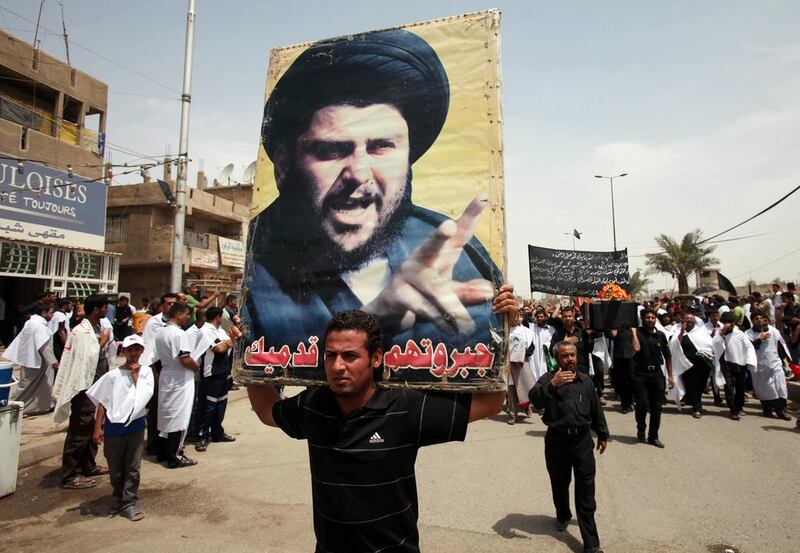Haider Al Abadi has many supporters, but very few friends. Increasingly isolated, even within the wider Shia movement he is part of, Iraq’s prime minister can still rely on some public support – and a few key allies.
Those allies include Muqtada Al Sadr, a powerful Shia cleric, and the United States – which is why America’s secretary of state, John Kerry, flew in for a surprise visit last week.
Still, none of that may save his reforms or lead to the approval of his cabinet. Today is the last day for Iraq’s parliament to approve the list of technocrats he has put forward.
Mr Al Abadi’s crime – which may yet cost him his role as prime minister – is not that he has failed to move quickly enough on reforms, nor that Iraq’s political class is widely seen as corrupt, nor even that ISIL has occupied major Iraqi cities and enslaved Iraqi citizens. Rather, his crime is that he is seeking to go beyond Iraq’s sectarian political system.
The list of proposed cabinet members that he has submitted to parliament does not conform to the sectarian system put in by the Americans after the 2003 invasion, whereby each grouping – Sunnis, Shia and Kurds – is given representation. For seeking to go beyond this, he has been accused of plotting a coup.
But even in seeking to surpass the sectarian system, he is exposing how powerful it is. For the current dispute over Mr Al Abadi’s latest cabinet is almost entirely an intra-Shia dispute.
Sunnis and Kurds have dissented, but their concerns are not paramount to Baghdad’s politicians.
The Shia alliance holds the majority of seats in the Iraqi parliament. Despite differences, the group has united due to fear of Iraqi Sunnis. As long as Mr Al Abadi can keep the Kurdish bloc on side – they, too, are united by their fear of Sunnis – there is simply no need to court Sunni opinion.
Yet the Iraqi National Alliance, an overarching bloc under which rival Shia parties are organised, is almost fracturing under the weight of the differences, and they are only interested in the opinions of each other.
Nouri Al Maliki, the former prime minister who hopes to return, Muqtada Al Sadr, the firebrand cleric who commands a military wing, and Grand Ayatollah Ali Al Sistani – it is between these individuals and their supporters that Mr Al Abadi’s fate will be decided. Yes, there is disagreement in a previously united Shia bloc. But the decisions that determine the fate of Iraq’s prime ministers are still decided by only one political grouping.
All of this points to the wider malaise of Iraqi politics, the sectarian system. That has been the fundamental reason for the dysfunction of the Iraqi state since the end of the US occupation.
A sectarian system undermines genuine cross-sectarian policies and locks people into sectarian boxes. Sunnis, Shia and Kurds remain in those categories, irrespective of social class, gender or politics.
Although ostensibly about maintaining a balance of power, it actually makes weak central government the only plausible outcome.
This has serious repercussions across the country. It means the Kurds think only in terms of being Kurds, constantly looking for advantage against the Sunnis and Shia; it means the Sunnis will always identify by sect, supporting policies that may work for one part of society but not others. Above all, it means that a Shia majority can marginalise many parts of Iraqi society.
It is precisely this privileging of one sect over another that has led to widespread corruption, a narrow view of what counts as the national interest in Iraq, and has even damaged the ability of the army to fight battles – as many Iraqis have learnt to great cost against ISIL.
Worse, this sectarian balance actually undermines Iraq’s fledgling democracy. It is one thing for Mr Al Abadi to have to listen to Iraqi public opinion, as expressed by people taking to the streets in anger. It is quite another for him to have to take orders from an unelected cleric.
When he points out “it was Sadr who demanded a government of independents”, he is either playing clever politics, putting the rationale for his own actions into the mouth of an important Shia player, or he is exposing the fundamentally undemocratic way Iraq’s politics is conducted.
In either case, this is short- term politics. A fledgling democracy needs confidence in the institutions of government. If the decisions of the government can be swayed by street protests too often, then politicians are at the mercy of the best organised group.
Mr Al Abadi may well survive this round, even if his cabinet doesn’t go through exactly as drafted. But there is a fundamental imbalance created in Iraqi politics by the sectarian system. Until it is addressed, politicians will never be able to govern in the genuine national interest. Indeed, with sectarian politics, it will never be clear where Iraq’s true national interests even lie.
falyafai@thenational.ae
On Twitter: @FaisalAlYafai





